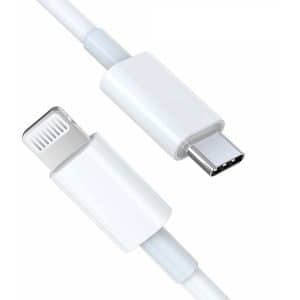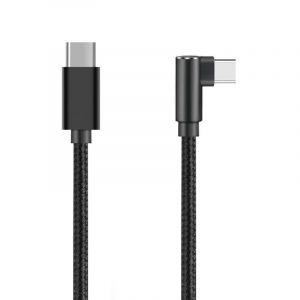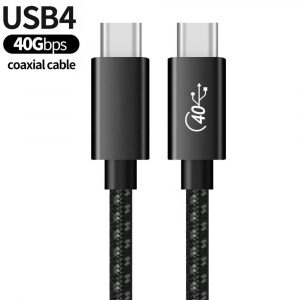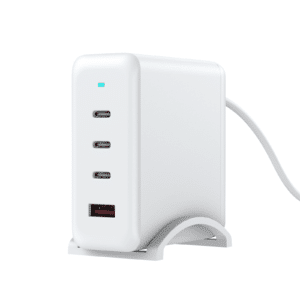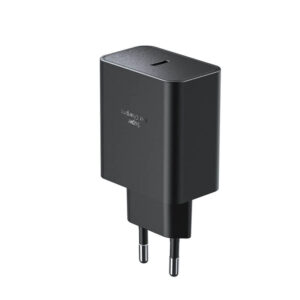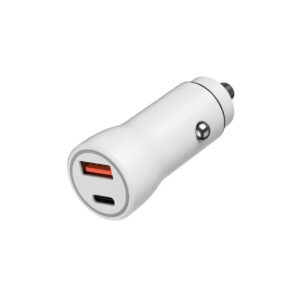When I started researching cables for my own tech gear, I kept running into one confusing question: USB4 or Thunderbolt 4?
USB4 Cable is an open standard developed by the USB-IF, while Thunderbolt 4 is an advanced interface created by Intel and Apple, offering stricter performance standards and better compatibility.
If you’re looking to upgrade your cables or devices, the differences between USB4 and Thunderbolt 4 really matter. Let’s break down everything clearly and simply.
What are the key differences between USB4 and Thunderbolt 4?
When I was comparing specs online, I noticed both standards claimed to support high speeds—but there had to be more to the story.
The key difference lies in licensing, compatibility, and guaranteed features: USB4 is royalty-free and flexible, while Thunderbolt 4 requires certification and guarantees minimum performance standards.
Thunderbolt 4 is built on top of USB4, but it adds strict minimum requirements. For example, every Thunderbolt 4 port must support:
Dual 4K displays
PCIe at 32 Gbps
Charging at 100W
40 Gbps data transfer
Daisy-chaining multiple devices
Meanwhile, USB4 is more flexible. Some USB4 ports may support all of those features, but others may not. This flexibility makes USB4 more affordable and accessible but also more confusing if you’re not a tech expert.
Here’s a quick comparison:
| Feature | USB4 | Thunderbolt 4 |
| Developer | USB-IF | Intel + Apple etc |
| Max Data Speed | 40 Gbps | 40 Gbps |
| Video Support | Optional (up to 1x4K/2xHD) | Mandatory (2x4K) |
| PCIe Support | Optional | Mandatory (32 Gbps) |
| Charging Support | Up to 240W | 100W (mandatory) |
| Daisy-Chaining | Not guaranteed | Always supported |
| Licensing | Open and royalty-free | Licensed and certified |
How do USB4 and Thunderbolt 4 compare in data transfer speeds?
I wanted the fastest possible cable for large file transfers, so speed really mattered to me.
Both USB4 and Thunderbolt 4 support a maximum data transfer rate of 40 Gbps, but Thunderbolt 4 guarantees it, while USB4 does not always deliver it.
Although both standards advertise 40 Gbps, there’s a catch with USB4. Some USB4 implementations only support 20 Gbps. Manufacturers are allowed to scale down certain features to reduce cost.
Thunderbolt 4 eliminates that uncertainty. Every Thunderbolt 4 device must support the full 40 Gbps.
This difference affects real-world use. If you transfer 4K video or large datasets frequently, Thunderbolt 4 is more reliable. For occasional tasks like charging your phone or syncing music, USB4 is more than enough.

Can USB4 devices be used with Thunderbolt 4 ports?
I was concerned if buying one cable meant giving up compatibility with other ports.
Yes, USB4 devices are fully compatible with Thunderbolt 4 ports because Thunderbolt 4 is built to support USB4, USB 3, and USB 2 standards.
Compatibility is one of Thunderbolt 4’s strongest points. If your device has a Thunderbolt 4 port, you can use:
USB4 cables and devices
Thunderbolt 3 and 4 devices
USB 3.2, USB 2.0 accessories
However, the reverse is not always true. Some USB4 ports may not support Thunderbolt features. So if you plug a Thunderbolt 4 dock into a USB4 port, it might not work properly.
This compatibility flowchart helps:
| Device Type | Works with Thunderbolt 4 Port? | Works with USB4 Port? |
| USB4 Dock | ✅ Yes | ✅ Yes |
| Thunderbolt 4 SSD | ✅ Yes | ❌ Not always |
| USB 3.2 Flash Drive | ✅ Yes | ✅ Yes |
| Thunderbolt 3 Monitor | ✅ Yes | ❌ Not always |

Which is more suitable for high-performance peripherals?
When I started using external GPUs and fast SSDs, not every port could keep up.
Thunderbolt 4 is better suited for high-performance peripherals, as it ensures full PCIe support, power delivery, and fast data speeds across all certified devices.
If you’re using devices like:
External SSDs for 4K video editing
eGPUs (external graphics cards)
Multiple high-res monitors
Pro audio interfaces
…you’ll want the most reliable, lowest-latency connection.
Thunderbolt 4 ensures 32 Gbps PCIe performance and low jitter, which is essential for creative professionals. USB4 can do some of these things—but not all USB4 ports guarantee PCIe support. That’s risky for heavy workloads.
Here’s a breakdown of peripheral compatibility:
| Peripheral Type | Recommended Interface | Reason |
| External GPU | Thunderbolt 4 | Requires full PCIe 32Gbps |
| 8K Video Monitor | Thunderbolt 4 | Stable dual 4K or single 8K |
| Charging Dock | USB4 or Thunderbolt 4 | Both support 100W |
| External SSD (Gen4) | Thunderbolt 4 | Fast read/write access |
| Webcam or Mouse | USB4 | Doesn’t need full bandwidth |

Are there cost differences between USB4 and Thunderbolt 4 devices?
When I built my work-from-home setup, budget was tight—and I found big differences in price.
USB4 devices are generally more affordable because the standard is open and royalty-free, while Thunderbolt 4 devices are more expensive due to licensing and stricter hardware requirements.
If you’re cost-conscious, USB4 is appealing. Manufacturers don’t have to pay Intel or pass certification tests. That makes USB4 docks, cables, and devices cheaper.
Thunderbolt 4, however, comes with a premium. Each product must be tested and certified. It’s more expensive, but also more reliable—especially for critical tasks.
A few examples from today’s market:
| Device Type | USB4 Average Price | Thunderbolt 4 Average Price |
| 1M Cable | $15–$25 | $30–$50 |
| Docking Station | $70–$120 | $150–$250 |
| External SSD (1TB) | $90–$120 | $150–$200 |
It’s all about what you need. For daily use and basic accessories, USB4 will save you money. For professional gear and guaranteed performance, Thunderbolt 4 is worth the investment.
Thunderbolt 5: What's New?
I recently came across Thunderbolt 5 and was immediately curious. Is it really that much better?
Thunderbolt 5 Cable builds on the foundation of Thunderbolt 4 but doubles bandwidth to up to 80Gbps and introduces support for up to 240W charging. It also supports up to 2 8K displays or a single 16K display.
Thunderbolt 5 is the latest evolution of Intel’s high-speed connectivity standard. It is fully backward-compatible with Thunderbolt 4, USB4, and USB-C. The headline feature is the jump in maximum bandwidth—from 40Gbps in Thunderbolt 4 to up to 80Gbps in Thunderbolt 5. This is achieved through something called Bandwidth Boost, which dynamically enables 120Gbps when needed for display-heavy workflows.
Thunderbolt 5 Key Specs
| Feature | Thunderbolt 4 | Thunderbolt 5 |
| Max Bandwidth | 40Gbps | 80Gbps (120Gbps burst) |
| Charging Support | Up to 100W | Up to 240W |
| Display Output | Dual 4K | 2 8K / 1x 16K |
| PCIe Support | Mandatory | Enhanced |
| Backward Compatibility | Yes | Yes |
If you’re working in media production, engineering, or gaming, Thunderbolt 5 offers the performance boost you’ve been waiting for. It’s not yet mainstream, but it’s a clear signal of where high-speed connectivity is headed.
Conclusion
USB4 is cost-effective and versatile, but Thunderbolt 4 delivers guaranteed speed and performance when it really matters.
Related Products
Wandkey Electronic Co., Ltd – Your Trusted Partner for Premium Phone Accessories
Wandkey Electronic Co., Ltd is a leading manufacturer specializing in high-quality phone accessories, offering a full range of USB-C Cables (2.0/3.0/3.1/3.2 Gen 2/USB4), Lightning Cable, iPhone Charger cable, PD Fast Charer, GaN Wall Chargers, Car Chargers, and more. With UL, CE, RoHS, Reach, PSE, KC, FCC, UKCA certificate, ensuring top-tier quality and safety.
What We Offer
We provide OEM & ODM services to help brands and businesses customize their products, including:
✅ Custom Branding & Logo Printing – Enhance your brand presence with personalized designs.
✅ Tailored Product Specifications – Customize cable lengths, charging power, materials, and more to fit your needs.
✅ Certified and High-Quality Manufacturing – Strict quality control and compliance with international safety standards.
✅ Packaging Customization – We offer bulk packaging, retail packaging, and eco-friendly solutions.
✅ Technical Support & After-Sales Service – Professional guidance from product development to after-sales assistance.
Who We Serve
Our business model is B2B wholesale, catering to brands and manufacturers who require premium charging accessories. Our main customers include:
✔ Phone accessory brands looking for high-end charging solutions.
✔ Electronics and smart device manufacturers needing reliable charging components.
✔ Medical equipment companies, monitoring system providers, and other industries requiring certified power solutions.
Looking for a reliable supplier for premium USB cables and chargers? Contact us today to discuss your project needs and get a customized solution tailored to your brand.
Top Topics
2025 Latest MFi Authorized Manufacturers list
Differences of Lightning Connector
How to check MFI Certification
How to get MFI Certification for Your Brand?
Why does the MFI Certified Lightning Cable so expensive?
MFI Product Packaging Requirement?
Disassemble MFI Lightning Cable
How do we guarantee the quality?
How to identify counterfeit or uncertified Lightning connector accessories
How to Choose Fast Charging Cable for Your Phone
How do I choose a USB-C cable?
Differences between USB 3.0 3.1 and 3.2
Test on USB C to USB C 3.1 Cable





